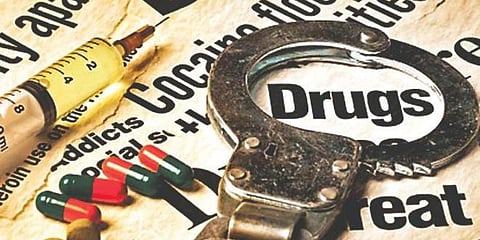

Another celebrity has been arrested recently for possession of drugs, and the media circus has come back to town with its leading clowns. Neither the sufferings of the walking dead on the Indian roads during the first lockdown, the continuing farmers’ struggle, the Chinese incursion into our land, scathing unemployment statistics nor the collapse of health infrastructure and dead bodies floating in the Ganga during the second Covid wave have claimed so much air time or real estate space in media than the lurid details of Bollywood rave parties, arrests, public humiliation and media trials of some B-grade actors.
Similar raids were conducted last year in Bengaluru, and many Kannada film artists were arrested for possession of illicit drugs with the accompanying media frenzy. It is a win-win situation for all. Any news related to the silver screen sells well; the cops come out as James Bond clones by arresting some kid with three grams of illicit drugs from a college dormitory. The news of some actor being marched in handcuffs like a terrorist who had attempted to blow up the Parliament and Red Fort is infinitely more entertaining to watch than a Nobel Prize winner warning about the impending economic collapse.
What makes possession of drugs such a big crime? India has had a history of psychedelic usage since Vedic times. The ritualistic consumption of divine Soma finds an important place in Vedic rituals. Bhang forms an integral part of Holi and Shivaratri celebrations in the form of thandai, and some temples even serve the special ‘baba ka prasad’ as a unique pious offering. There are even government-approved bhang shops in many north Indian cities such as Varanasi, Jaisalmer, Pushkar etc.
However, the use of cannabis is illegal in most states of India. As per Section 10 of the NDPS Act 1985, whoever is licenced to produce bhang shall be allowed to make it from the leaves of the wildly grown cannabis plants only. They shall not use the flowering tops or the resin produced from the plants. How such rules can be implemented is anyone’s guess in a country where cannabis is also industrially cultivated. How would one distinguish whether the bhang was produced from wildly growing cannabis, and whether only its flower, and not the industrially cultivated one, was used?
The above is just an example of the bizarre laws that deal with drugs in India. The punishments as per the NDPS Act are pretty stiff. Cultivation of cannabis without a licence can get you rigorous imprisonment of 10 years. Possession of drugs like cocaine, as small as two gm, can get you rigorous imprisonment of one year. India sees drug consumption or possession by itself as a criminal offence.
This is against natural justice. Any activity can be illegal only when it causes harm to others and the society, or is against the country’s interests. The criminalisation of drug use is supposed to protect the user from the harmful effects of drugs, but such an act can only harm the user. The blanket ban on all kinds of drugs in the NDPS Act is another confusing thing. The range of drugs is staggering—cannabis, opioids, tramadol, amphetamine and MDMA, the list is exhaustive, and all kinds of drugs are bracketed together. Even carrying a drug for medicinal purposes without a valid prescription could lead to arrest and prosecution.
There is no clarity on what constitutes consumption. For any criminal proceedings, one needs to prove a crime has been committed at a specific time, by someone, against someone and with a motive or reason. At what stage can consuming a drug be constituted as a crime? Is the crime deemed to have been committed after consuming the drug or in the act of consuming the drug? A murder or a theft committed many years ago, if proved today, can rightfully lead to prosecution and punishment. But, if someone has used a drug once, many years ago, can he be prosecuted now or in the distant future for that crime? There is no distinction between recreational users or addicts.
The judge can send both to the de-addiction centre irrespective of whether you are a first-time user, accidental possessor or a drug junkie, or he can send both to the prison. In a country where police have been accused of fixing innocents, even on murder charges, one can imagine how easy is it to fix anyone for possessing two or three grams of some substance. Last year, the Vidhi Centre for Legal Policy came up with a study analysing the NDPS cases in Mumbai. As high as 97.7 percent of 12,946 cases in 2017 and 97.3 percent of 9,743 cases in 2018 involved possession for personal consumption, as per the report. Cannabis accounted for 87 percent of all arrests in Mumbai, and those arrested were mostly the needy and the poor. A few high profile cases involving celebrities bookend the scenario.
Just like how the Mental Healthcare Act prevented the criminalisation of attempted suicide, it is time to decriminalise the usage of drugs. Drug users need counselling, and in the case of addicts, rehabilitation and not criminal punishments. As of now, the NDPS Act of criminalising the usage has become a tool for harassment. The commercial producer, distributor and seller of the drugs shall be dealt with severely by the law, but the user who is a victim should be spared and helped.
Anand Neelakantan
Author of Asura, Ajaya series, Vanara and Bahubali trilogy
mail@asura.co.in